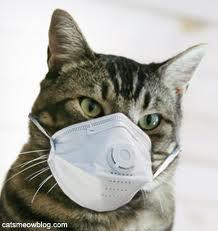Join the Club!
Fill out the contact form below and we’ll get you a free exercise tracker!

Ah, the fall. It’s a time of crisp air, falling leaves and lots and lots of stuff to make your nose get all stuffed up. I’ve noticed that my seasonal allergies are saying hello. And I’ve also noticed a number of my students coming to class with nasal voices and balled-up tissues. So I thought I’d talk a little bit about exercise and allergies.
Most of the time, it’s safe to exercise if you have allergies. In fact many people feel better after they exercise. However if you have severe asthma, exercise-induced asthma or exercise-induced anaphylaxis, you should definitely consult a doctor for special recommendations concerning exercise. And everybody should see a doctor before engaging on a new and rigorous exercise program. But for most people with allergies, exercise is simply annoying and not dangerous.
That said, there is some stuff you can do to make exercising with allergies less traumatic and more fun. Here’s some basic ideas:
1. Manage Your Meds: The timing of your medications can really make a difference in your exercise routine. First and foremost, make sure you take your meds as directed. If you take an antihistimine or nasal decongestant make sure you do so at least an hour before your workout so it has a chance to kick in. Be sure to know your medications. Some medications will have an effect on your Resting Heart Rate (RHR). Make sure you know if your medicines fall into this category and be aware of your heart rate as you work out. Finally, you need your medicines to help you at two times when it comes to working out. It needs to make your nose as open as possible while you exercise, and it needs to help you sleep at night. If you don’t sleep well, you won’t feel like working out the next day. Also as a side note, if you receive allergy injections, you should avoid exercise an hour or two after you receive them. Exercise can change the absorption rate of some injections and increase the risk of side effects.

2. Know Your Allergens: If you can, it’s really good to know what your allergies are. It makes a difference if you are allergic to pollen or mold or dust or animal dander or pollution. Once you know what to avoid, you can then go about avoiding it.
Bugs or Bees: Make SURE you have your Epi pen with you. It could save your life. And don’t forget your fully charged cell phone. You should also be extremely careful when exercising in the woods and may find it safer to stay on well marked and paved trails.
Pollen: If you are allergic to pollen you can probably still exercise outdoors. You may wish to avoid outdoor exercise at peak times of the day which include 5AM-10AM and dusk. You also may wish to use a dust mask or stay inside when pollen counts are highest. Also be especially careful on hot, dry days as this makes the pollen blow around more. Try to exercise away from areas with high concentrations of allergens like grassy areas or fields. On dry, windy days, you may want to wear wraparound sunglasses to help keep irritating allergens out of your eyes. When things get really bad, exercise inside.
Mold: Again, if you are allergic to mold you can still exercise outside. You may wish to avoid exercising on particularly humid days. Try also to exercise away from areas with high concentrations of allergens like lakes or ponds. When things get really bad, exercise inside.
Dust Mites: You may find it easier to exercise indoors. Whenever possible, avoid exercising on or near carpets.
Pollution: Pay attention to air quality days–on red flag days you may wish to just exercise inside. Be careful not to exercise too close to traffic, roadways, factories or airports. Keep an eye on smog levels.

3. Be nice to your nose: It’s important to be able to breathe out of your nose when you work out. Your nose warms and filters the air. Breathing through your mouth when you exercise can irritate your throat or your lungs. If medicine alone doesn’t do the trick, you might consider using a nasal saline spray (NOT A DECONGESTANT SPRAY which can be addictive and dangerous). Some people find relief from using a neti pot. And even making sure you blow your nose well before you step out can help. Oh, and don’t forget to keep a few tissues in your pockets for your time out on the road.

4. Stay hydrated: If you suffer from allergies, it is especially important to drink lots of fluids. Many allergy medicines have a dehydrating effect, and breathing through your mouth both irritates your throat and dehydrates you. Be sure to bring fluids along when you work out, and drink plenty of fluids before and after you exercise.

5. Clean up afterwards: If you’ve exercised somewhere that has a lot of allergens, it’s important to do everything you can to clean up after you’re done. Make sure to shower (and wash your hair) and change your clothes afterwards. I love enjoying an outdoor bonfire at night, but I’ve found that I’m pretty allergic to the smoke and ash. That means no matter how tired I feel afterwards, I change my clothes, shower and wash my hair before I go to bed. You may even find that rinsing your nose out with a saline nasal spray or a neti pot after your workout makes you feel a whole lot better.
Precautions aside, I find that the benefits of exercising with allergies far outweigh any discomfort from additional exposure to allergens. But like anything else, an ounce of prevention is worth a pound of cure. So remember to take a few simple steps before you walk out the door!
And before you walk out the door of this blog post, it’s time to award our fifth and final free pedometer! Kerri Danner, you’ve won! Just send an email with your mailing address to me: jeanette at thefatchick dot com.
Thanks!
P.S. Want to get access to FREE STUFF? Just opt in RIGHT HERE!